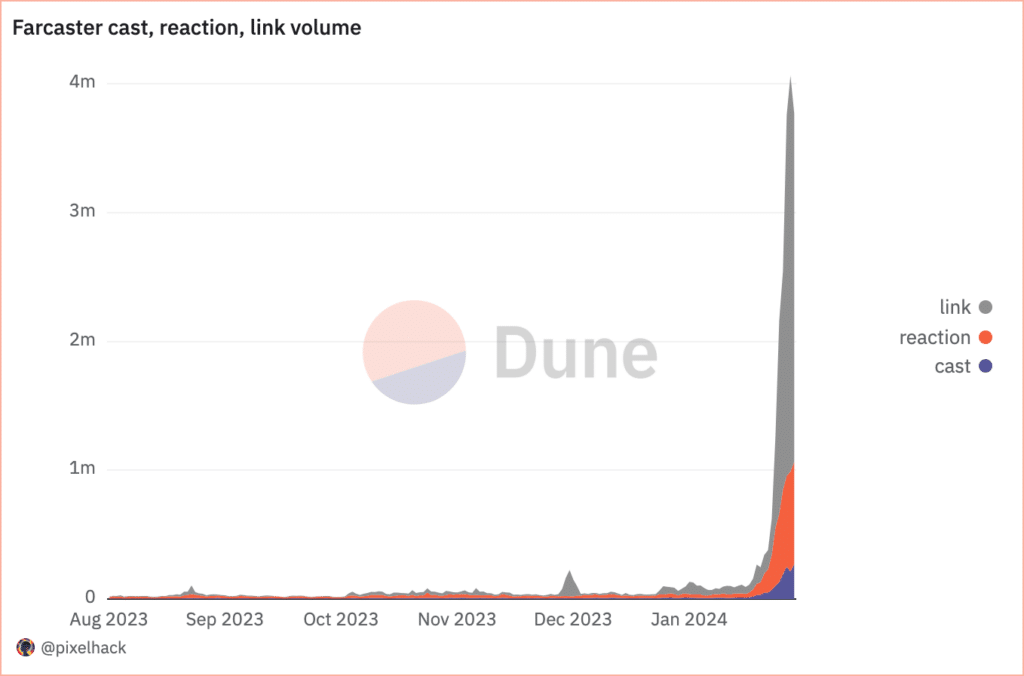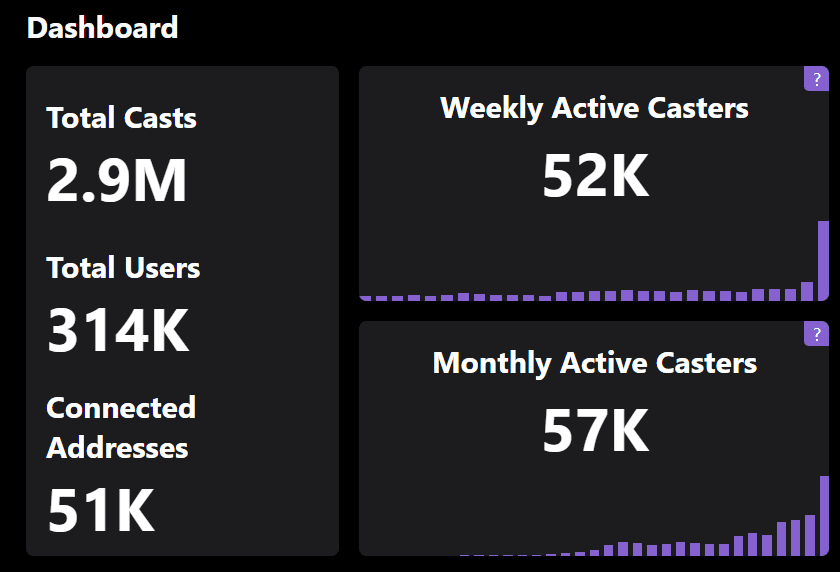Farcaster aims to shake up centralized social media by empowering users with data ownership while giving them the familiar web2 feel. Will it transform the scene or fade after the initial excitement?
Farcaster is a crypto project that deviates from the typical genre of web3 applications. While blockchain has been diving head-first into the finance scene, its application in other areas has been rather slow.
The social media sector is one of these areas where the dominance of web2 apps has not allowed web3 applications to shine.
Platforms such as X, Facebook, Instagram, TikTok, and Reddit have overshadowed the prominence of their emerging web3 counterparts such as Friend.tech, Diamond App, Lenster, Mastodon, and Chingari. These web3 social platforms have not gotten the traction they needed to go mainstream.
However, Farcaster appears to be sticking its neck out, with its increased social mentions bolstered by a recent update. The protocol aims to transform the way web3 users communicate online by enabling the creation of decentralized social networks, where users and developers have full ownership and access to their data and identity.
Farcaster leverages Optimism, a layer-2 scaling solution built atop the Ethereum network. It also adopts web2 techniques to facilitate easy onboarding and better user experience. This allows it to incorporate the best practices of web2 and web3 for a balanced approach.
What is Farcaster?
Introduced in 2020 by Varun Srinivasan and Dan Romero, both former employees at Coinbase, Farcaster boasts a network of decentralized social apps working on its protocol. This lets anyone create and use social apps that are interoperable and resistant to censorship, according to its website. The project secured $30 million in a funding round in July 2022.

Farcaster is one of the fastest-growing crypto projects in 2024, with over 314,000 users and 89,548 average daily casts, per data from Farcaster Network. Its success has been bolstered by positive feedback and recognition from the crypto community, with adoption from industry leaders such as Ethereum co-founder Vitalik Buterin.
Farcaster is not a single social media platform. It represents a collection of decentralized applications for various use cases. Farcaster users own their accounts and relationships, with the protocol granting them the opportunity to move between different apps without losing data or identity. In addition, developers can build on Farcaster using any programming language, per the Farcaster documentation.
Here are some of the live apps on Farcaster:
Warpcast
Warpcast is a microblogging platform serving as the major Farcaster client. The platform enables users to share brief text messages, known as “casts,” and engage with others. The protocol shares a striking semblance with X, giving users the web2 feel they are familiar with while leveraging web3 benefits.
Farcaster’s Warpcast also employs a drastic but effective measure to eliminate bot activity, a feat Elon Musk has struggled to attain on X. The protocol charges $5 as a sign-up fee to this effect.
There are additional charges for posting casts on the protocol. Users would have to purchase storage units, which would give them a limited number of interactions on Warpcast. Each storage unit, going for $5, has a validity of one year and allows 5,000 casts, 2,500 links, and 2,500 reactions.
Warpcast goes beyond basic messaging. Regarding its web3 features, the protocol offers additional functionalities like non-fungible token (NFT) minting and token claiming. Warpcast also features a feed for NFTs, allowing its users to embed collectibles for minting.
In addition, Warpcast supports channels. These channels gather feeds of casts around a particular topic on the platform. For instance, casts on Ethereum could be pooled into the Ethereum channel. The feature was incorporated into the protocol last June, and has since seen the creation of multiple channels around several topics.
Farcaster co-founder Dan Romero also announced the launch of Warpcast group chats on Jan. 24, with a maximum of 100 members for each group. Users can create group chats through the Messages section, per Romero’s post.
Warpcast recently introduced a new feature called “Frames,” allowing users to embed interactive apps within their casts and offering features like gaming, polling, and tipping.
Frame
Frame is intricately linked to the Warpcast client, allowing users to convert any cast into an interactive app called a “frame.” These frames can have diverse functionalities, like facilitating games, quizzes, and other interactive elements. The protocol was launched on Jan. 26 and accounted for the increased publicity Farcaster recently enjoyed.
Farcaster has since surged in user activity, attracting about 52,000 weekly users, with 51,000 connected Ethereum addresses, according to data from Farcaster Network. This figure rose from 41,000 between Feb. 6 and 8. The platform also boasts around 2.9 million messages, with a user growth rate of 12%.

Moreover, the Frame platform serves as the driving force behind the “Frames” feature on Warpcast. Users can access frames while scrolling through their feeds on Warpcast. This allows them to interact with the app without leaving their feed.
The protocol has a marketplace where users can explore and use frames crafted by other developers or even sell their own frames to earn tokens. A recent surge in trading saw some Frame NFTs sell for thousands of dollars on Farmarket, with the single-highest sale coming in at $7,000.
These frames are in the form of Farcaster IDs (FIDs), represented in digits. With its functionality, Frame adds a layer of dynamic interactivity and functionality to the Farcaster network.
Currently, Frame, which boasts the Farcaster EdDSA authorization system, only supports the Ethereum network and layer-2 protocols built atop the second-largest blockchain. Romero recently disclosed that on-chain functionality would extend to the Solana blockchain starting next week. Subsequently, Frame would incorporate Solana account verification.
Can Farcaster rival traditional platforms?
Farcaster challenges the dominance of centralized platforms in web2 social media. These platforms are notorious for collecting and selling data and censoring content. Farcaster, like most SocialFi protocols, seeks to offer an alternative.
Romero revealed that Farcaster has reached over 5,000 on-chain recoveries with the introduction of a solution to a common problem: people forgetting passwords. Drawing from his experience at Coinbase, where he noticed users often struggle with password issues, he wants Farcaster to be self-custodial, Romero said in an X post.
Farcaster employs two protective layers to achieve this. At sign-up, it generates a new mnemonic linked to a Passkey stored on the user’s device, eliminating the need for writing down a seed phrase.
If the Passkey is lost, Farcaster’s protocol helps transfer the account to a new address. This address is, by default, set to Warpcast. However, users with more advanced knowledge have the opportunity to change it to an address they have personal control over.
While Farcaster is growing fast, it’s too early to call it a game-changer. Similar projects surged but then fizzled out, like Friend.tech last August. This shows the need for ongoing engagement beyond the initial excitement. Platforms like Bluesky and Threads often lose steam once the hype dies down. Farcaster and others must keep innovating and engaging users genuinely to stay relevant. Its journey, like others, depends on how well it can adapt and truly connect with users over time.




